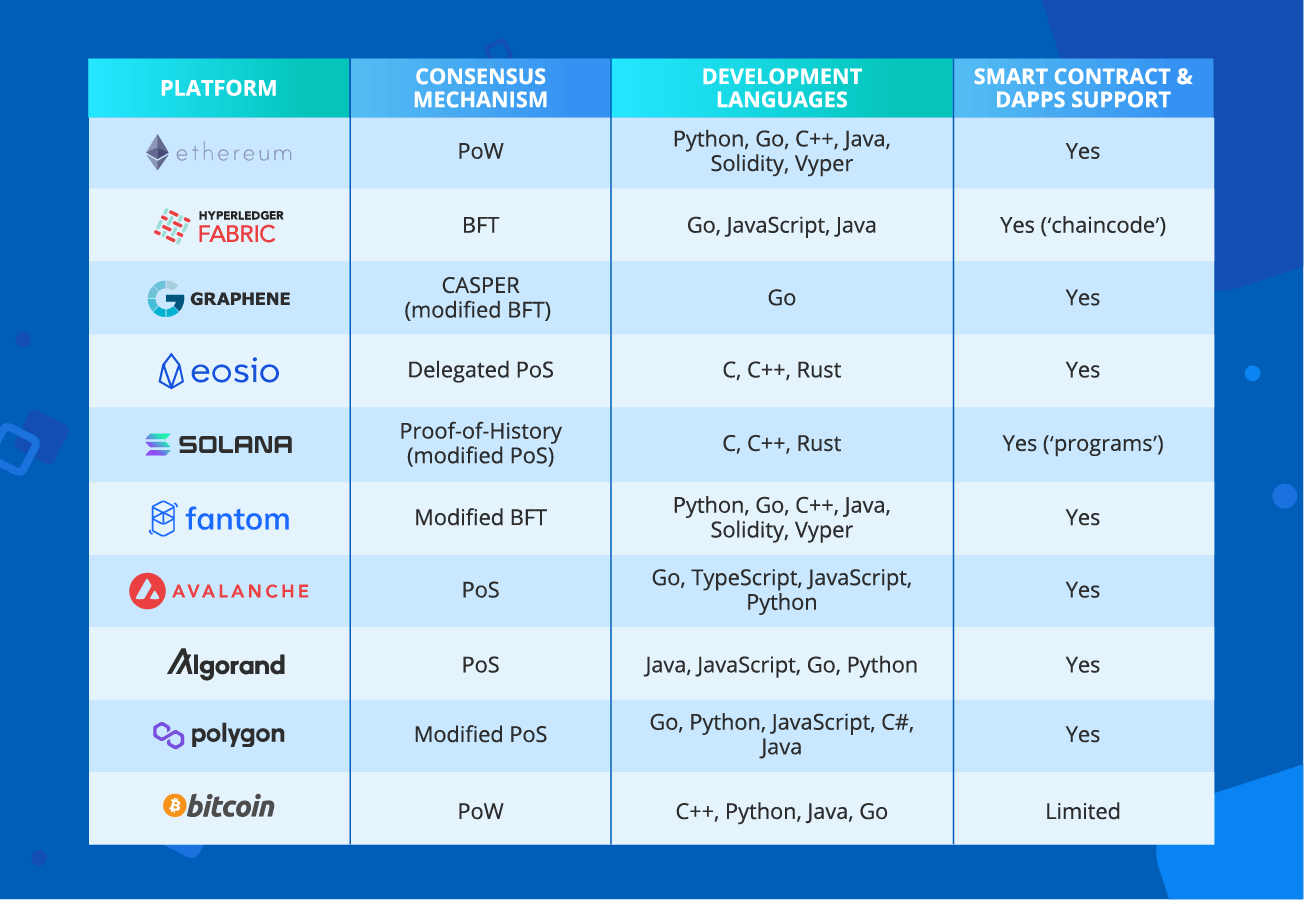How to Develop a Blockchain Solution
A Complete Guide
Since 2020, ScienceSoft's skilled blockchain developers have been providing professional blockchain development services, ensuring high security, maintainability, and minimized gas consumption of blockchain solutions.
Blockchain Development: Essence
Blockchain development is the process of building software that functions within the blockchain platform and guarantees immutability and full traceability of data. Blockchain solution development helps introduce robust workflow automation and enhanced security across various business use cases.
Blockchain Development Guide Highlights
How to develop a blockchain in 4 steps
- Conduct a feasibility study.
- Conceptualize the solution (choose an architecture type, consensus mechanism, and blockchain platform).
- Develop the blockchain solution and perform QA testing.
- Integrate the solution with the relevant systems and deploy it to production.
Project roles: Business consultant, blockchain architect, project manager, blockchain developer, back-end developer, UX/UI designer, front-end developer, DevOps expert, QA engineer.
Sourcing models: In-house, team augmentation, partial outsourcing, full outsourcing.
Costs: Depending on solution type, the chosen tech stack, and other factors. You're welcome to use our free calculator to estimate the development budget for your case.
With 4,200+ successfully completed software development initiatives and a dedicated blockchain team on board, ScienceSoft designs strategies for blockchain development projects and undertakes their implementation.
Types of Blockchain Solutions
Visit ScienceSoft's dedicated pages to learn about the capabilities, benefits, and cost factors of blockchain-based solutions.
Blockchain networks
Secure and scalable permission-based or permissionless decentralized ecosystems with minimized downtime.
Blockchain-based transaction platforms
Peer-to-peer platforms with no single point of failure for transparent, fast, and safe multi-party transactions.
Blockchain-based assets
Programmable crypto assets built on blockchain that may represent a digital form of money, tradeable assets, utilities, governance rights, and more.
Blockchain Development Process
Below are the typical blockchain development steps ScienceSoft takes when developing blockchain solutions for our clients.
Step 1. Feasibility study
ScienceSoft usually starts each blockchain development project by analyzing a customer’s specific needs and expectations. Quite often, we help clients understand whether a blockchain solution is viable and worth their investment. Depending on the industry you come from, we may ask some of these questions:
- Do you have cross-company workflows that require automated accountability?
- Does your company deal with continuous supply of assets?
- Do you want to get a third-party/centralized authority out of your processes’ loop?
- Does your company deal with sensitive documentation or records shared between multiple organizations?
If any of these questions yields a confident ‘yes’, you would most likely benefit from a blockchain solution. ScienceSoft’s consultants proceed to discuss the business specifics with you and then perform in-depth research to compile a list of tangible benefits that the blockchain technology can bring to your business. Once the research is done, we present high-level costs breakdown and ROI calculations.
|
|
ScienceSoft’s tip: A case-by-case approach is indispensable for understanding the possible benefits of blockchain as some viable cases can not fit into the points above. Make sure to discuss your situation with our consultants. |
Step 2. Blockchain conceptualization
After making sure that you would benefit from a blockchain solution, ScienceSoft’s consultants start building a solid business case that describes high-level requirements to your blockchain solution and client web/mobile apps that will interact with it. Our experts also cooperate with tech teams to decide on how blockchain will be incorporated into your current business processes and/or IT systems.
Upon forming a high-level vision, ScienceSoft moves on to detailed project planning, which involves several important technical decisions.
Architecture type choice
There are 3 major blockchain types: public, private (permissioned), and hybrid. The key difference is in whether the data is stored and shared on an unlimited number of nodes or across a restricted network. In the hybrid blockchain, certain types of data are shared privately while other types of data are public.
The choice usually depends on your business case. After analyzing the requirements assembled by the consultants, ScienceSoft’s blockchain architects suggest possible architecture types and discuss the pros and cons of every option with the project stakeholders.
Choice of a consensus mechanism
Consensus mechanism is a model that defines which nodes have the right to validate new blocks in the chain and describes how validation conflicts are resolved. The most popular consensus mechanisms that ScienceSoft implements in its blockchain projects are Proof-of-Work, Proof-of-Stake, Byzantine Fault Tolerance, and Proof-of-Authority, as well as their modifications.
Proof-of-Work (PoW)
This consensus boils down to one simple statement: “the more powerful the node, the more authority it has”. Proof-of-Work considers the mining capabilities of the computers in the blockchain network and grants the right to validate a block (i.e., make a change or a rollback in the chain) to the nodes that are more efficient in mining. Large networks of such highly productive nodes are very difficult to attack but may be costly to support.
Best for: We often recommend this mechanism to businesses with already existing large computational resources.
Proof-of-Stake (PoS)
Unlike PoW consensus, PoS gives more authority to the nodes with larger and richer crypto investments. Computers can do little to no mining and get the right to validate a block based on their cryptocurrency balance. This mechanism helps significantly minimize energy bills but also poses higher risks of a cyberattack.
Best for: We suggest a variation of this mechanism – Delegated Proof-of-Stake – to various businesses. Delegated PoS tackles the risks by giving the authority to only a few proven and rich nodes, albeit making the blockchain more centralized.
Proof-of-Authority (PoA)
Instead of the mining power or cryptocurrency balance, the node’s identity or reputation is what defines its weight in the network. Computers that have a track record of hacking activities are automatically blocked and do not have the right to validate blocks.
Best for: We usually recommend using this mechanism in private enterprise blockchain solutions, since nodes need to identify as company property to get the right of block validation.
Byzantine Fault Tolerance (BFT)
A system with this consensus uncovers malicious nodes thanks to constant monitoring and detailed verification of peer-to-peer information exchange. The malicious nodes’ authority is then intentionally minimized and disregarded during consensus. The number of known, secure nodes should always be at least three times higher than the number of possible malicious nodes.
Best for: ScienceSoft usually offers this mechanism to clients with large networks.
Blockchain platform choice
The final choice concerns the blockchain network to deploy the developed solution on. ScienceSoft provides both the development of a blockchain from scratch and hard/soft forking of an existing blockchain platform.
- From scratch – costlier and longer development that results in a unique blockchain network with its own cryptocurrency. We suggest this option to blockchain startups or fintech customers, who have their individual vision of a blockchain platform, which they want to make competitive.
- Forking – since all existing blockchain platforms are open-source, their codes are easily available and can be modified. Modifications (also called ‘forks’) are x1.5-2 faster to deliver and yield fully functioning blockchain networks with as many differences from and/or similarities with the original as you want. Forking lets you choose to create your own cryptocurrency but doesn’t require many investments in the conceptual and architectural decisions. This is a typical strategy of our non-fintech customers.
To decide what existing platform to fork, ScienceSoft’s blockchain architects discuss with you such factors as consensus mechanisms, smart contract support, and software development languages.

The choice of the platform wraps up the necessary technical decisions and allows an architect and a PM to work on delivering elaborate project documentation: architecture design, requirement specification, and the development project plan (including task description and schedule).
Step 3. Blockchain development and QA
Duration: from 2 months (depending on the scope)
Blockchain solution development usually covers implementation of blockchain software, an off-chain client application (web and/or mobile) for interacting with blockchain software, and back ends for hosting the two components.
When implementing blockchain projects, we make sure that quality assurance of each part of the solution is done in parallel with coding to eliminate logic vulnerabilities and errors as soon as possible. Our QA engineers diligently prepare tests to ensure deep and high coverage and choose the most suitable test network for rigorous post-development testing.
Step 4. Deployment and integration
Duration: 1-3 weeks
Once the blockchain solution passes testing on the test network, ScienceSoft’s team starts deploying it on the actual blockchain network. DevOps experts oversee containerization of blockchain components for deployment and perform integration between the blockchain and regular software infrastructure. Real network testing, which is run in the presence of a client, is the last stage before we perform other requested integrations (e.g., with enterprise software) and set the solution live.
Consider Blockchain Development with ScienceSoft
In software development since 1989, ScienceSoft offers professional consulting on and development of blockchain solutions for all industries and domains.
- A business case on blockchain development.
- Assistance with the choice of the blockchain network type (private, public, hybrid), architecture design, and tech stack.
- A detailed feature set for a blockchain system.
- A plan of integrations with required software.
- Preparation of test cases.
- Roadmap for blockchain system implementation, including a risk mitigation plan.
Blockchain development services
- Blockchain software conceptualization.
- Blockchain architecture design.
- Blockchain solution development (including the back end and client apps).
- Integration of the blockchain system into an existing software ecosystem.
- Quality assurance.
- User training (optional).
- Blockchain software support and evolution (if required).
Why Choose ScienceSoft as a Blockchain Development Partner
- Since 2020 in enterprise blockchain and cryptotech development.
- Experience with Ethereum, Hyperledger Fabric, Graphene, and more.
- Dedicated C++, Golang, Node.js, Java, Python, and JavaScript departments.
- Quality-first approach based on a mature ISO 9001-certified quality management system.
- Robust security management supported by an ISO 27001 certificate.
Our awards, certifications, and partnerships
Typical Roles in ScienceSoft’s Blockchain Projects
Business consultant
- Analyzes business needs.
- Performs a feasibility study.
- Describes the scope of the entire blockchain solution.
- Compiles functional requirements.
Blockchain architect
- Discusses architecture type consensus mechanism, and platform choices with project stakeholders.
- Designs a blockchain architecture.
- Takes part in controlling the compliance of the blockchain solution with the requirements.
Project manager
- Creates a development schedule.
- Estimates development efforts.
- Controls the development progress.
- Reports the progress to project stakeholders.
- Manages the project team.
Blockchain developer
- Delivers code of the blockchain using best practices.
- Fixes code issues on QA’s notices.
- Deploys the solution.
- Performs audits.
UX/UI designer
- Designs the user experience and user interface of client applications.
Front-end developer
- Delivers code of client software (web and/or mobile applications).
- Fixes code issues on QA’s notices.
Back-end developer
- Delivers code of the back end of a blockchain solution.
- Fixes code issues on QA’s notices.
DevOps engineer
- Containerizes blockchain components for streamlined testing and facilitated deployment.
QA engineer
- Writes tests for automated testing of the blockchain solution.
- Verifies the blockchain compatibility with the quality standards defined in the project plan.
- Logs testing results.
Sourcing Models of Blockchain Development
- All in-house – you task your in-house team with the blockchain solution implementation and bear all responsibility for the project’s success.
- Team augmentation – you hire and manage several blockchain experts to cover the skill gap in your in-house team or shorten time-to-market.
- Partial outsourcing – you outsource most processes, save for project management, and rely on a vendor’s experienced blockchain professionals.
- Full outsourcing – you outsource the entire development project to one of the best blockchain development companies and receive a complete, well-tested solution in time and on budget.
Benefits of Blockchain Development Outsourcing to ScienceSoft
|
Risk-free cooperation We analyze economic feasibility of blockchain development for each individual case and can develop a Proof of Concept to test solution viability. |
Consistent collaboration We work in close collaboration with project stakeholders to get an in-depth understanding of their blockchain needs and fully meet their expectations. |
|
|
Focus on security We implement robust fraud detection algorithms, authorization controls, transaction validity confirmation, and other security tools to ensure protection of blockchain solution data. |
|
Optimized costs of implementation
|
Flexible pricing options
|
Cost of Blockchain Development
Key factors that affect the costs of blockchain software development include:
- (For blockchain networks) The chosen blockchain network type — private, public, hybrid.
- The type of blockchain consensus mechanism.
- (For solutions built on a market-available blockchain) The chosen blockchain network (e.g., Ethereum, Solana, Polygon) and its transaction costs.
- The complexity of the solution's functional modules (network, dApps, smart contracts, oracles).
- The number and specificity of web and mobile applications to interact with the blockchain solution.
- The scope and complexity of blockchain software integrations.
- Non-functional requirements (performance, latency, security, compliance, etc.).
- The planned deliverable (PoC, MVP, a full-scale solution).

From ScienceSoft’s experience, blockchain development may cost around $50,000–$2,000,000+, depending on solution complexity, the scope of required integrations, and the chosen blockchain software design patterns.
Want to understand the cost of your blockchain project?
About ScienceSoft
ScienceSoft is an IT consulting and software development agency headquartered in McKinney, Texas. Drawing on a mature, ISO 9001-approved quality management system, we design and develop robust and secure blockchain solutions. We also offer professional advisory sessions on blockchain architecture design and project planning of blockchain development initiatives.






